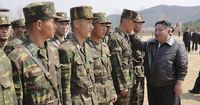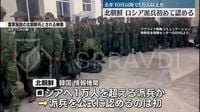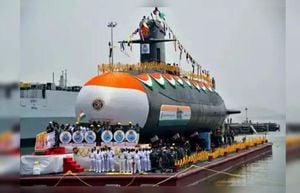On April 28, 2025, North Korea publicly acknowledged for the first time that it has been dispatching troops to Russia under the command of Kim Jong-un to participate in the ongoing conflict with Ukraine. This significant announcement marks a pivotal moment in the relationship between North Korea and Russia, as it highlights their military cooperation amid the ongoing war in Ukraine.
According to the Korean Central News Agency (KCNA), North Korean soldiers have made "significant contributions" to the liberation of Russian territory that was previously occupied by Ukrainian forces. The Korean Labor Party has claimed that the battles to liberate the Kursk region in western Russia were victorious, which they assert reflects the "highest strategic level of solid military friendship" between North Korea and Russia.
The announcement came after the Chief of the Russian army's General Staff, Valery Gerasimov, reported on April 26, 2025, that Russian forces had completely recaptured the Kursk region from Ukrainian troops, who had been conducting cross-border attacks since August 2024. Ukraine, however, has denied these claims, stating that it continues to operate in the Kursk and Belgorod regions.
In a statement made by Kim Jong-un, he expressed pride in North Korea's alliance with Russia, stating, "Those who fought for justice are all heroes and representatives of the honor of the fatherland." He emphasized that North Korea considers it an honor to ally with a powerful nation like Russia. This sentiment was echoed in the official statements from the Korean Labor Party, which highlighted the importance of their military contributions to the conflict.
On April 27, 2025, the Central Military Commission of the Workers' Party of Korea confirmed that North Korean military units had participated in the liberation operation in the Kursk region. Kim Jong-un stated that he made the decision to participate in the war based on the activation conditions of Article 4 of the Comprehensive Strategic Partnership Treaty, which outlines mutual military intervention between the two nations in the event of an emergency.
In addition to acknowledging troop deployments, Kim Jong-un praised the North Korean soldiers, referring to them as "representatives of the honor of the fatherland," and announced plans to erect a monument to commemorate their efforts in the conflict. He also revealed that there had been casualties among the North Korean troops and instructed that families of the participating soldiers receive special treatment.
Estimates from Ukrainian authorities suggest that North Korea has sent around 14,000 soldiers to Russia, including approximately 3,000 support troops. Despite initial concerns about their lack of experience in armored vehicle and drone warfare, reports indicate that North Korean forces have quickly adapted to the combat environment.
Prior to this announcement, both North Korea and Russia had refrained from confirming or denying the deployment of troops. The recent public acknowledgment is seen as a significant escalation in their military collaboration, particularly as the conflict in Ukraine continues to evolve.
As the situation unfolds, analysts are closely monitoring the implications of North Korea's involvement in the conflict. The military alliance between North Korea and Russia raises questions about the potential for further escalation in the region and the broader geopolitical consequences of such a partnership.
In summary, North Korea's admission of troop deployment to Russia represents a notable shift in its foreign military policy and underscores a deepening alliance with Moscow amid ongoing hostilities in Ukraine. This development not only impacts the dynamics of the conflict itself but also signals a potential reconfiguration of alliances in the region, as both nations navigate the complexities of international relations in a time of war.





